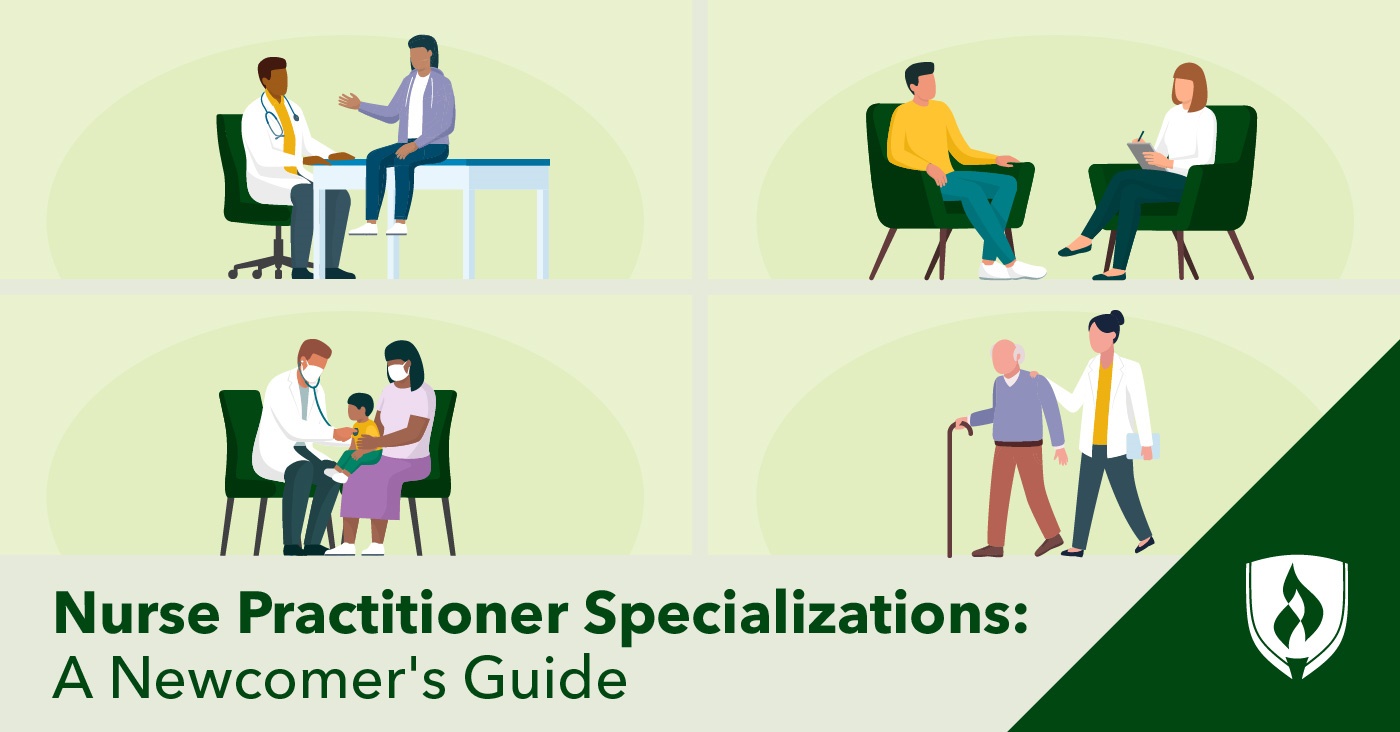
It doesn’t take long for any patient who regularly interacts with a skilled nurse practitioner (NP) to acknowledge the critical role they play in healthcare. Across the country, NPs provide expert care to patients of all ages and backgrounds and are often a lifeline for underserved communities where access to quality care is limited.
Whether you’re an established registered nurse (RN) looking to move into an advanced practice role or are new to the healthcare field and exploring a potential career option, you likely have some questions about becoming a nurse practitioner.
One important and sometimes surprisingly complex subject to sort out is that of nurse practitioner specializations. In this article we’ll highlight why specialization matters, look at some of the common specialization options and answer other critical questions for you so that you can have that information before enrolling in a Nurse Practitioner program.
Why do nurse practitioners specialize?
Like physicians and other healthcare professionals, it’s common for nurse practitioners to focus their careers on working with a specific patient population or type of care. The human body—and treatments for all that potentially ail it—is an expansive and complex subject that can confound and surprise even the most experienced healthcare professionals. While all nurse practitioner programs provide strong foundations in generalist NP skills, narrowing the focus via a specialized program can help NPs who are invested in working with a specific patient population develop a deeper expertise for working with that group.
Even so, it’s still very common for NPs to pursue a specialization that leads to working with a broad patient population focus. Ultimately, the choice comes down to personal preference—some value the flexibility of a broader population, while others know that there’s a specific population that they’d prefer to work with. Either way, the specialization topic is one you’ll have to address sooner than later.
Unlike registered nurses who typically move into a specialty focus with relative ease after completing their formal education, new nurse practitioners often narrow their focus prior to (or during) their graduate studies. This means prospective NPs need to understand their options for specialization and carefully consider the potential benefits and drawbacks of each. To explore further on where nurse practitioners work, you can read more about it in “Where Do Nurse Practitioners Work?”.
What are some of the most common nurse practitioner specializations?
Generally, nurse practitioners align their practice with one of six patient populations or focus areas:
- Adult-Gerontology Nurse Practitioner (A-GNP)
- Psychiatric-Mental Health Nurse Practitioner (PMHNP)
- Family Nurse Practitioner (FNP)
- Pediatric Nurse Practitioner (PNP)
- Neonatal Nurse Practitioner (NNP)
- Women’s Health Nurse Practitioner (WHNP)
Among these specializations you may also find a dividing line between primary and acute care to accommodate the different skillsets and training needed to care for high- and low-acuity patients. This distinction will also have an important influence on where you can practice as an NP.
Adult-Gerontology Nurse Practitioners
A-GNPs focus their care on adults and geriatric patients. NPs who choose this path can subspecialize in either primary or acute care.
What A-GNPs love about this specialty: This specialty can provide a versatile foundation for treating adult patients in a variety of settings. Working exclusively with adult patients also provides opportunities for A-GNPs to place a greater focus on topics like end-of-life hospice care or how to manage long-term health issues in an aging population.
If you've ever cared for an aging parent or elderly relative, you might have a soft spot for the vulnerability and dignity of this demographic.
What challenges should prospective A-GNPs know about? While still a strong generalist path for prospective NPs, the focus on adult populations rules out pediatric care, which Family NPs and Pediatric NPs (see below) can still provide.
Additionally, working with older patients can be emotionally taxing and seeing the challenging reality of aging every day is not for everyone. That said, there is fulfillment in being there to help optimize healthy aging and demystify the end-of-life process for patients and families.
Psychiatric-Mental Health Nurse Practitioners
A unique option for prospective nurse practitioners, the role of PMHNPs is to provide care and therapies for patients with mental illnesses.
What do PMHNPs love about this specialty? It’s an opportunity to practice in a critical (and, for too long, overlooked) field. Mental health issues are common and as varied as the patients who experience them, making this an engaging and interesting practice area. There’s also a great deal of satisfaction that comes from helping patients who’ve often suffered quietly for years before seeking help.
“I love that simply educating the patient and their loved ones about their mental health condition can have a positive impact equal to the medication treatment and psychotherapy I provide,” says Rasmussen University associate professor Dr. Rhone D’Errico. “This is the essence of what it means to be an advanced practice registered nurse: using education, expert practice and empathy to improve patients’ lives.”
What challenges should prospective PMHNPs know about? This is a highly specialized track to take, which can make a transition away from mental health care challenging if you decide this isn’t the right fit for you in the long term.
Additionally, mental health treatment itself is complex and challenging. Rarely are patients contending with issues that have an easy, “by the book” fix.
“Patients may not have insight into the nature of their condition, may be resistant to treatment, and can struggle to meet the recommendations offered by the PMHNP,” says Dr. D’Errico.
Challenges—like patients not adhering to treatment plans, weighing medication side-effects and navigating the uncertainty that comes with complex mental health diagnoses that feature overlapping symptoms—can be a tall order for some.
“A healthy dose of compassion and empathy goes a long way in forming a therapeutic alliance with these patients and helping them to live happier, healthier lives.”
Family Nurse Practitioner
Family nurse practitioners typically provide generalist primary care for patients of all ages.
What do FNPs love about this specialty? The versatility of this path can provide a lot of flexibility in how you choose to shape your career.
It's empowering when you can work with so many different patient groups--pediatrics, adults, school-aged children or geriatrics. Family NPs can find work in almost every area and can be a primary care provider for whole families.
With that versatility comes variety in the types of health issues you can address as an FNP.
“I love that there is so much variety as an FNP,” says Dr. D’Errico. “I care for patients and families presenting with a broad spectrum of health needs. Some of these are acutely evolving issues, like sudden-onset abdominal pain or a wound needing repair. Other problems are chronic, such as managing elevated blood pressure or diseases such as heart failure.”
What challenges should prospective FNPs know about? Simply put, they have a lot of ground to cover.
“The population focus served by the FNP is broad and complex,” says Dr. D’Errico. “The FNP must be a true generalist. This challenge, although formidable, also makes the FNP widely in demand in many health care settings.”
Dr. D’Errico emphasizes FNPs will need to do a little self-reflection when considering employment opportunities.
“Although this [versatility] is great from an employment perspective, it can be daunting as many prospective employers are not fully aware of the scope of practice of the FNP,” Dr. D’Errico says. “As such, it is incumbent upon the FNP to ensure we are only accepting employment in appropriate settings for our training, education, licensure and certification.”
Pediatric Nurse Practitioner
Pediatric nurse practitioners care for young patients (typically from birth to 21 years old) as they develop into adulthood. Pediatric NPs often subspecialize in working in either acute or primary care.
What do PNPs love about this specialty? Working with kids! They’re cute, goofy, precocious, excitable and can bring a smile to even the most stone-faced clinician.
Many pediatric NPs have long had their hearts set on working with this patient group or have had a positive experience working in pediatrics as an RN. The opportunity to pair serious work with sometimes silly, kid-friendly communication is undeniably appealing for some.
What challenges should prospective PNPs know about? Treating a pediatric patient also means you’re working closely with their families—and that can be a mixed bag. Caring for pediatric patients with chaotic or neglectful home lives can be heartbreaking, and parental beliefs or opinions can run counter to what you know is best for the patient’s health. That’s not an easy position to navigate as a healthcare provider.
Also, while this is not the “narrowest” specialty, the pediatric focus can be a limiting factor for your career options.
Neonatal Nurse Practitioner
Neonatal NPs focus on caring for newborn infants as they make the transition to life outside of the womb.
What do NNPs love about this specialty? It provides an opportunity to take a step up in responsibility in caring for infants in a critical care environment. Dr. Beth Diehl, a neonatal nurse practitioner and Rasmussen University associate professor, says her experience as a nurse in this environment helped her realize becoming an NNP was the right next step.
“I had several years of staff nurse experience and admired the degree of skill and expertise demonstrated by other neonatal NPs,” Dr. Diehl says. “They had great authority and autonomy in patient care management and routinely performed endotracheal intubations, chest tube placements, umbilical artery and vein cannulations. All very impressive stuff!”
Being able to take on a larger role when caring for ill newborns is fulfilling. You’re trusted by families during a time of crisis and helping them work through what can be incredibly challenging circumstances.
What challenges should prospective NNPs know about? Caring for critically ill infants means you’re going to see parents and families navigate some incredibly sad and challenging circumstances.
“[Often] they are grieving the loss of either a full-term pregnancy, a ‘perfect’ child or a healthy baby,” Dr. Diehl says. “Helping them navigate that course is rewarding but challenging, as well.”
A practical potential drawback of this role is that you’re typically going to be working in hospital NICU settings, which operate all day, every day, and that schedule may not appeal to everyone. Additionally, this is a narrow population focus which can limit your options if you eventually decide you want to work with a different patient population.
Women’s Health Nurse Practitioner
Women’s health nurse practitioners care for women of all ages, with a focus on reproductive, obstetric and gynecological health.
What do WHNPs love about this specialty? This specialty is often a passion pursuit. WHNPs are drawn to working with women and helping them navigate important health decisions regarding reproductive health, family planning and OB-GYN care.
This role provides an opportunity to work as a healthcare provider for a historically overlooked patient population and provide the necessary expertise for managing women’s health issues across the lifespan.
Can nurse practitioners change specializations?
The short answer is yes. But there are some important caveats to keep in mind. Depending on your starting point, you may need further education or training to safely (or legally, depending on the regulations of your state) practice in certain settings. That said, there are certainly areas of overlap among the above specializations and some changes in focus are easier to accomplish than others.
For example, a pediatric acute care NP isn’t likely to transition to a psych-mental health NP role without additional training, but a family NP can usually work in a pediatric primary care clinic. In general, it’s easier to transition from a broader population focus to a narrower focus.
Keep in mind there are also subspecialization options you may be eligible to pursue. Common subspecialty options include (but are not limited to):
- Cardiology
- Dermatology
- Emergency care
- Gastroenterology
- Nephrology
- Oncology
While the specifics will vary, many of these subspecialties include professional certification options that may require additional training or education to fulfill.
Advice for choosing a specialization
Given the breadth of areas where NPs can focus their careers, it’s understandable if you’ll need a little time to sort out what specialization option is best for you. In the meantime, there are things you can do to help gain some clarity.
Think through what you already love about nursing and want more of. Take opportunities to try different roles and settings when you can, and take your time deciding on a specialty. Working as a float pool nurse for a little while can be an ideal way to test out different things.
Dr. D’Errico suggests asking to shadow practicing NPs in different settings.
“Nothing beats observing the day-to-day [routine] of practicing NPs,” Dr. D’Errico says. “Choosing an NP specialty is a significant and personal decision. Take your time, shadow, observe, speak to a variety of NPs and you will make the decision that makes the most sense for you.”
Keep in mind there is also some timing flexibility for this decision while enrolled in a nurse practitioner graduate program. You can still adjust your focus area or gravitate towards certain types of work. Nurse practitioners who want to change their work can also pursue different certifications
With that passion in clearer focus, he opted to pursue a post-graduate certificate in psychiatric-mental health. While a direct path to working with your preferred patient population is ideal, it’s important to remember you have the ability to pivot later on in your career if needed.
Find your focus
The road to becoming a nurse practitioner is full of big milestones and important decisions, and finding the right focus for your practice is certainly one question worth careful consideration. Take the time to research your options and learn from practitioners in the field first. When you’re ready, visit the Rasmussen University Nurse Practitioner program page to learn more about our specialization offerings, start dates and more.




